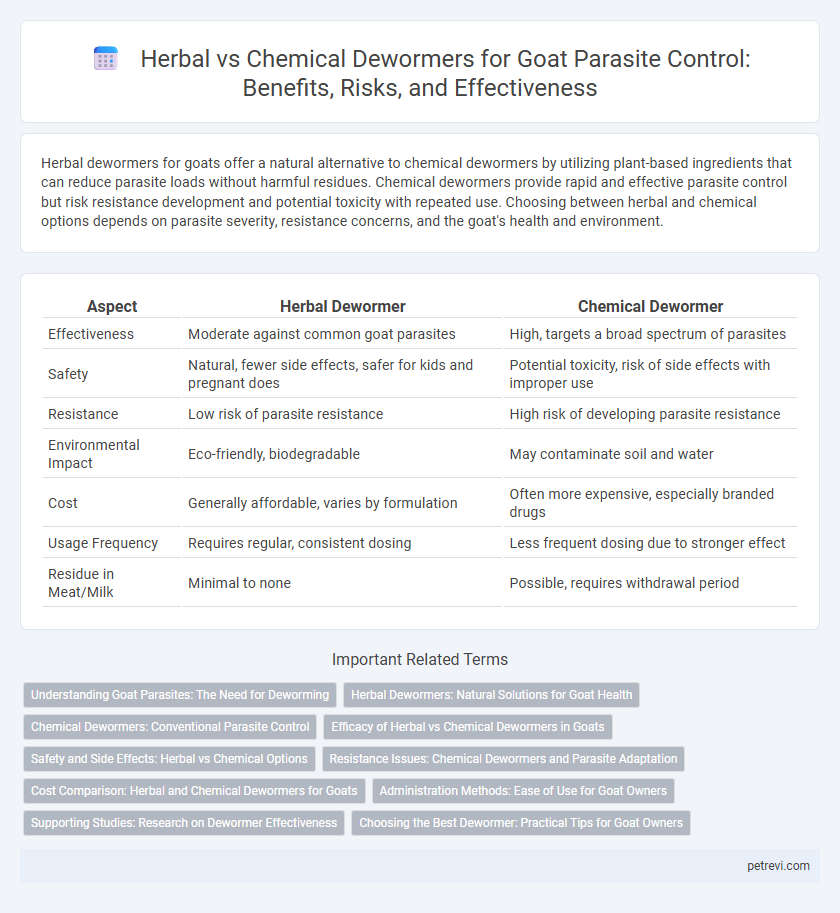Herbal dewormers for goats offer a natural alternative to chemical dewormers by utilizing plant-based ingredients that can reduce parasite loads without harmful residues. Chemical dewormers provide rapid and effective parasite control but risk resistance development and potential toxicity with repeated use. Choosing between herbal and chemical options depends on parasite severity, resistance concerns, and the goat's health and environment.
Table of Comparison
| Aspect | Herbal Dewormer | Chemical Dewormer |
|---|---|---|
| Effectiveness | Moderate against common goat parasites | High, targets a broad spectrum of parasites |
| Safety | Natural, fewer side effects, safer for kids and pregnant does | Potential toxicity, risk of side effects with improper use |
| Resistance | Low risk of parasite resistance | High risk of developing parasite resistance |
| Environmental Impact | Eco-friendly, biodegradable | May contaminate soil and water |
| Cost | Generally affordable, varies by formulation | Often more expensive, especially branded drugs |
| Usage Frequency | Requires regular, consistent dosing | Less frequent dosing due to stronger effect |
| Residue in Meat/Milk | Minimal to none | Possible, requires withdrawal period |
Understanding Goat Parasites: The Need for Deworming
Goat parasites such as Haemonchus contortus and Trichostrongylus colubriformis cause significant health issues, including anemia and reduced weight gain, necessitating regular deworming. Herbal dewormers often contain natural ingredients like neem, garlic, and wormwood, which exhibit anthelmintic properties but may vary in effectiveness against different parasite species. Chemical dewormers, including benzimidazoles and macrocyclic lactones, provide targeted parasite control with proven efficacy, although resistance development is a growing concern in goat herds.
Herbal Dewormers: Natural Solutions for Goat Health
Herbal dewormers for goat parasites offer a natural alternative, leveraging plant-based ingredients such as wormwood, garlic, and neem that possess antiparasitic properties effective in managing internal parasites. These herbal remedies enhance goat health by supporting immune function and minimizing the risk of chemical resistance commonly associated with conventional chemical dewormers. Incorporating herbal dewormers into parasite control programs promotes sustainable goat farming and reduces reliance on synthetic anthelmintics.
Chemical Dewormers: Conventional Parasite Control
Chemical dewormers offer a conventional approach to parasite control in goats, utilizing synthetic anthelmintic compounds such as ivermectin, benzimidazoles, and levamisole to effectively target gastrointestinal nematodes and external parasites. These chemical agents provide rapid parasite reduction and are widely used in commercial goat farming due to their proven efficacy and ease of administration. However, resistance development in parasite populations presents a significant challenge, necessitating strategic rotation and integrated parasite management practices to maintain their effectiveness.
Efficacy of Herbal vs Chemical Dewormers in Goats
Herbal dewormers in goats offer a natural alternative with fewer side effects but generally show variable efficacy against parasites compared to chemical dewormers. Chemical dewormers, such as benzimidazoles and macrocyclic lactones, provide faster and more consistent parasite control, especially for resistant gastrointestinal nematodes. However, integrating herbal remedies with strategic chemical use can help reduce resistance development and maintain long-term efficacy in parasite management.
Safety and Side Effects: Herbal vs Chemical Options
Herbal dewormers for goats typically offer a safer alternative with minimal side effects, relying on natural ingredients like neem, garlic, and pumpkin seeds that support parasite control without disrupting gut flora. Chemical dewormers, though often more immediately effective against a broad spectrum of parasites, carry risks such as drug resistance, toxicity, and potential negative impacts on the goat's liver and immune system. Careful consideration of parasite load and health status is essential when choosing between herbal and chemical treatments to balance efficacy with animal safety.
Resistance Issues: Chemical Dewormers and Parasite Adaptation
Chemical dewormers often lead to parasite resistance in goats due to frequent use and improper dosing, reducing their long-term effectiveness. Parasite adaptation to chemical treatments results in increased resistance, making infestations harder to control. Herbal dewormers offer a natural alternative with lower risk of resistance, promoting sustainable parasite management in goat herds.
Cost Comparison: Herbal and Chemical Dewormers for Goats
Herbal dewormers for goats often present a cost-effective alternative to chemical options, with many herbal remedies derived from locally sourced plants reducing expenses significantly. Chemical dewormers typically involve higher upfront costs due to drug formulation and regulatory approval, but may require fewer doses over time compared to some herbal treatments. Evaluating the total cost of treatment should also consider efficacy and the potential for parasite resistance affecting long-term financial outcomes.
Administration Methods: Ease of Use for Goat Owners
Herbal dewormers for goats typically come in forms such as powders, pellets, or liquid extracts that can be easily mixed with feed or water, offering a user-friendly administration method for goat owners. Chemical dewormers often require precise dosing through drenching or injection, which may demand more skill and handling experience to ensure effectiveness and avoid stress to the animals. Choosing the right administration method affects the ease of use, animal compliance, and overall parasite control efficiency in goat health management.
Supporting Studies: Research on Dewormer Effectiveness
Research indicates that herbal dewormers, containing botanicals such as wormwood, garlic, and neem, exhibit moderate efficacy against common goat parasites including Haemonchus contortus and Ostertagia. Chemical dewormers like ivermectin and fenbendazole demonstrate higher immediate parasite load reduction, with controlled studies showing up to 95% effectiveness. However, emerging resistance to chemical anthelmintics highlights the growing importance of integrated parasite management using both herbal and chemical approaches.
Choosing the Best Dewormer: Practical Tips for Goat Owners
Herbal dewormers contain natural ingredients like wormwood, garlic, and pumpkin seeds that help reduce parasite loads without chemical residues, making them suitable for organic or sensitive goats. Chemical dewormers offer targeted, fast-acting control against a broad spectrum of parasites but may contribute to resistance if overused or improperly dosed. Goat owners should rotate dewormer types, monitor fecal egg counts regularly, and consult a veterinarian to choose the most effective parasite control while minimizing resistance risk.
Herbal dewormer vs Chemical dewormer for Goat parasites Infographic

 petrevi.com
petrevi.com